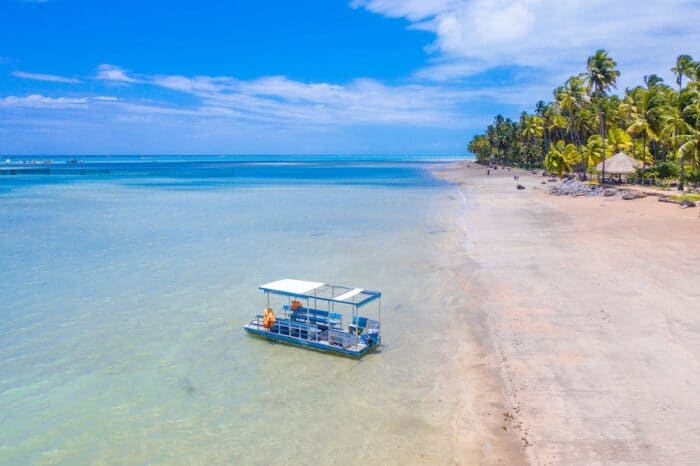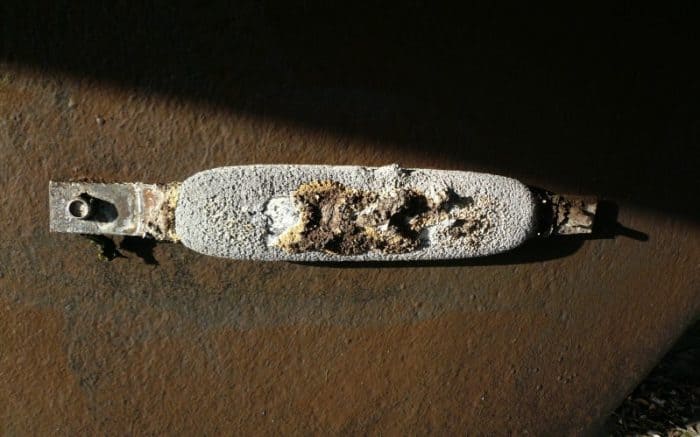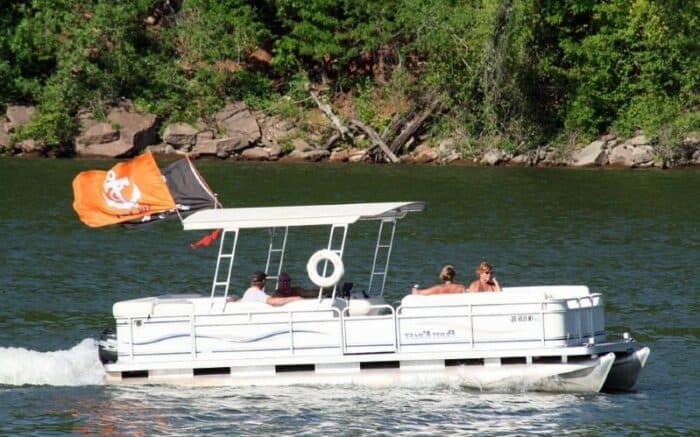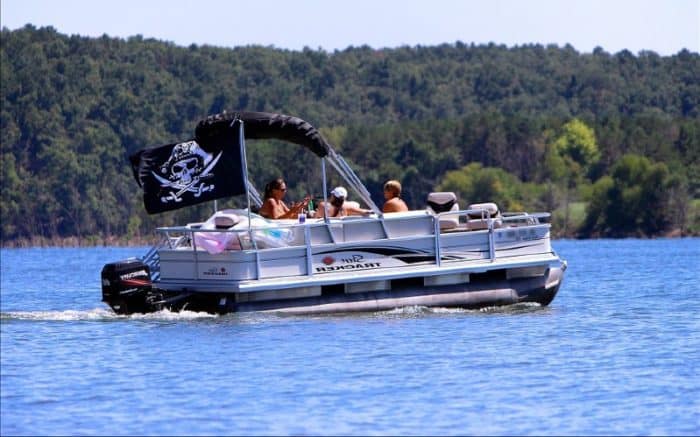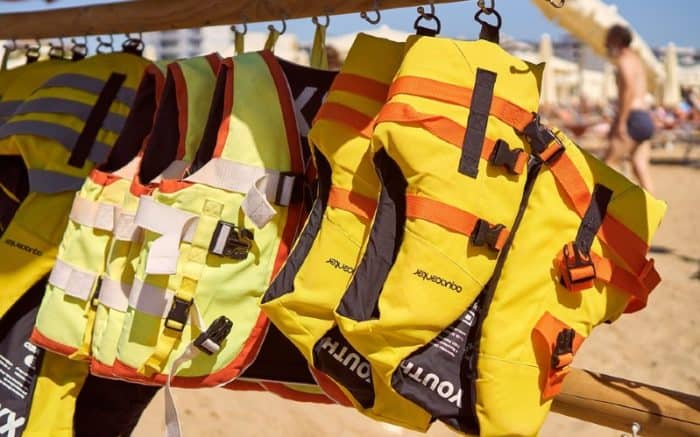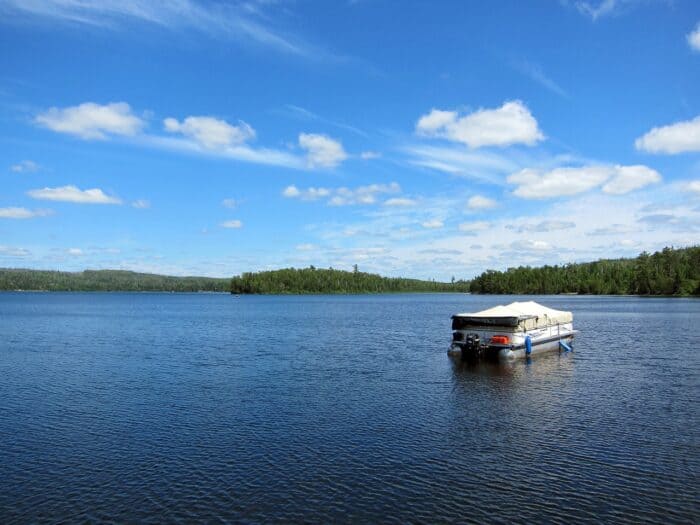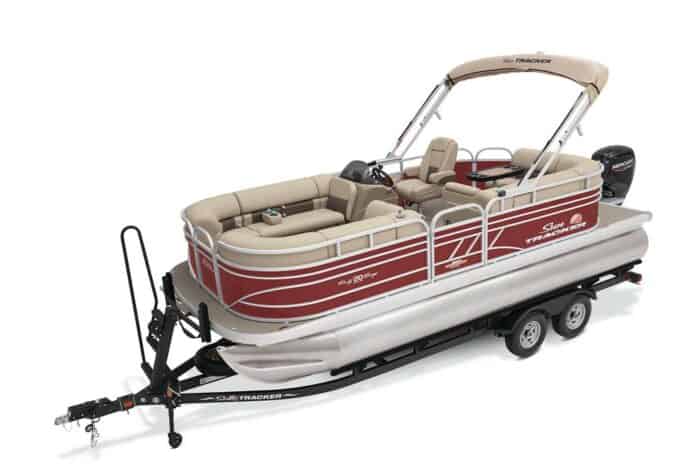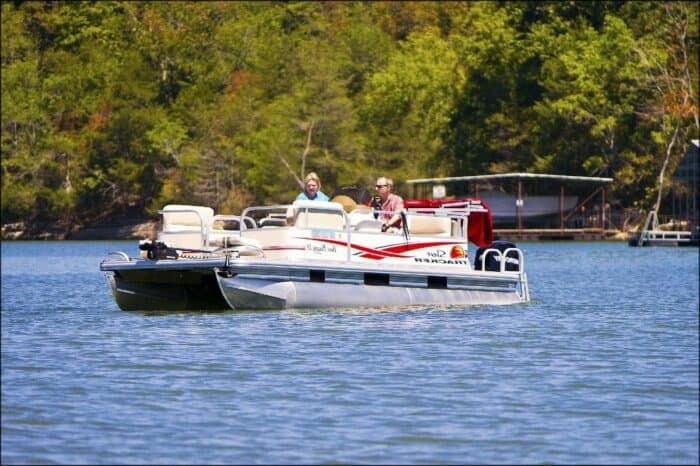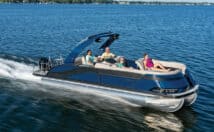Can a Pontoon Boat Go in the Ocean?
The answer to this question is yes, you can take a pontoon boat in the ocean. In fact, some modern pontoon boats with things like V-frame construction, tritoons and more durable materials may be fairly adept at handling open waters and strong enough to hold their own in the chop if you head out with your fishing gear for an afternoon. However, should a pontoon boat go in ocean waters is another question and for the most part I would say the answer to that is no. Let’s dig a little deeper to find out why.
Can Pontoon Boats Handle Rough Seas?
The reason pontoon boats are usually limited to inland waters like fresh water inland lakes and rivers is that they don’t play well with bad weather. This is a product of how a pontoon is designed. A boat like a sailboat has a much deeper draft than a pontoon boat. In fact, nearly every boat will have a deeper draft than a pontoon boat.
The draft is the part of the boat that exists below the waterline. To non-boaters it’s just the bottom of the boat. But on a sailboat, for instance, that may include a very large keel that extends deep into the water. A keel offers stability to the sailboat so that when wind pushes against the sail, the keel prevents it from flipping right over. So it’s crucial for the operation of that kind of boat.
A pontoon does not have a deep draft and that is by design. The entire boat is supported on the pontoon tubes, which keep the hull out of the water. This gives you a lot of stability in calm waters. In fact, a pontoon boat handles small waves even more smoothly than boats with a deeper draft. However, on the open sea it can become a serious liability.
The draft of a boat helps keep it stable in rougher waters. A pontoon in rough waters has nothing to help keep it stable. On rough enough seas a pontoon can hit a wave and be flipped right over. And even if it’s not that bad, when the water is too choppy you’ll find that everything on the deck of your pontoon slides back and forth at the whims of the waves.
Having a third tube can offer a degree of stability but the overall design of a pontoon is still not ideal for rough seas. The v-shaped hull of traditional boats literally allows them to cut through waves and choppy seas. But a pontoon will smash into these waves. If swells get too high they will either crash over the bow of the pontoon causing it to take on water, or lift the boat right up out of the water and flip it over.
Because the ideal weight distribution of a pontoon boat requires the bow to be lighter, this becomes a problem in rougher waters. As a pontoon rides into swells and waves, the front can be lifted so far that the rear of the boat will submerge and the pontoon will flip.
From what I have seen, if you have three foot waves, you’re pushing your luck in many pontoon boats. Four feet has to be the absolute limit and even then that’s probably much more than many pontoon boats can handle. You’ll have to play this one by ear based on what you know about your own ability to handle the boat and the boat design itself. If you have never been on the ocean in your pontoon and don’t know what it can handle, then I would say try to stay near shore, first and foremost. Don’t stay out in waves greater than two or three feet if you’re not feeling very confident in how it handles.
What is the Most Suitable Pontoon Boating Environment?
If you want to take a pontoon out to sea you need to be cautious about how and where. I would save a protected saltwater bay or a cove as the best place for a pontoon in an ocean. If you want to hit the open sea then you absolutely must be aware of the weather and keep it close to shore just for safety sake. If the waves start kicking up, even the most stable of pontoon boats will become much harder to handle. Coves, bays, inlets and other such passages offer more safety and coverage.
What You Need to Keep in Mind with a Pontoon Boat on the Ocean
If you’re committed to taking a pontoon boat out to sea, here are a few things you’ll want to keep in mind to ensure everything works out the way you want it to.
Preparation and Design
If you’re an experienced boater already you know one of the big problems with taking a pontoon on the ocean has nothing to do with how it handles rough seas, it’s how it handles the sea period. Because pontoons are not designed as seafaring vessels, they’re not designed for saltwater at all. That’s a big concern if you plan on keeping your pontoon in good condition for years to come.
If nothing on your pontoon is designed to handle saltwater then you could risk a lot of damage by taking your boat out to sea. The last thing you need to experience in a pontoon boat is destructive galvanic corrosion, but that is absolutely what will happen.
Anodes
Your pontoon boat needs to have anodes installed. For saltwater, you want zinc anodes. They will react with the saltwater and the electrical field created by your boat and will slowly be eaten away while the rest of your pontoon is relatively preserved. Without anodes, the salt water and electrical field will cause the ocean to react with your pontoons and eat away at them until they fall apart.
You’d need at least two or three anodes on each pontoon, plus one or two on your engine as well. Once they’ve degraded by about 50% they’d need to be replaced.
Other Corrosion
The aluminum of your pontoons is arguably the safest metal on the boat in saltwater. Aluminum is slow to corrode. In fact, anodes made for brackish water will be made of aluminum. But the rest of your boat is still in danger. Copper wires, steel fittings, pretty much anything else made of metal on a pontoon boat was probably not designed with saltwater in mind.
Depending on how your pontoon boat was made, galvanization may be more or less of a problem. Some models do a good job of isolating metals so you need not worry about the two coming into contact, thus reducing those issues. But that’s definitely not every model.
The safest thing you can do, aside from outfitting your entire pontoon boat with less corrosive metals and gearing it up to reduce the effects of galvanization and corrosion, is to put effort into salt water maintenance.
Salt Water Maintenance
You can prevent saltwater from causing your pontoon boat too much damage by getting rid of it as soon as possible. That means washing it with freshwater as soon as you’re out of the ocean. Use a high pressure hose, but not a power washer, to rinse off all the salt water and salt deposits. You need to get every surface, even the seats. Wipe it all down.
The motor is going to need to be flushed as well. You need to make sure this is very thorough to get all the saltwater out. You really don’t want saltwater resting in your motor after you’re done at sea.
If you are keeping your boat docked in the water then your tubes need to be prepared for it. They’ll need to be painted with an anti-fouling and anti corrosion paint, just like other boats.
A coating of a product like Sharkhide metal protectant on all your metal surfaces can also help keep them resistant to the effects of the sea. Remember, just being on the ocean is going to expose everything to saltwater thanks to crashing waves, sea spray and so on.
Electrical Prep
You want to make sure the electrical system on your boat is always in good working order. But if you’re in salt water it’s especially important that you don’t have any wires accidentally touching the tubes or exposed in any way. Saltwater plus electricity causes galvanization and it’s going to really play havoc with your boat if you’re not careful.
Trailer Prep
When you’re considering how to get your pontoon boat ready for the ocean, don’t forget your trailer. Just like your pontoon, if you didn’t get one specifically with the intention of salt water boating, it may not be ready. You want a galvanized trailer that won’t corrode too easily when it gets exposed to the saltwater. If your trailer isn’t suited for saltwater, that corrosion can easily transfer to your boat.
Don’t forget to spray off your trailer alongside your boat when you get them both out of saltwater.
How to Handle a Pontoon Boat on the Ocean
Aside from getting ready for saltwater, you need to know what to do if the sea is rougher than you’re used to in freshwater.
Stay Close to Shore
I said this before but it bears repeating. You don’t want to leave shore behind and head to open water in a pontoon boat, especially if you’ve never done it before. If things go bad, being near shore means it’s more likely that you’ll still be safe.
Distribute Your Weight
Pontoon boats sometimes have a weird center of gravity. You’ll want even weight on either side of the centerline, but also be aware of how to distribute it front to back. Rough waters can make either end dip a lot depending on how waves hit.
Keep the Bow Up
For a lot of boaters, your instinct will be to try to minimize the damage of heading into a wave. That means slowing down. Don’t slow down. If you slow down as you’re taking a pontoon boat into a wave, you run the risk of dipping the bow and having the wave come crashing up onto the deck. Maintain your speed as you reach waves. If they’re bad enough, make sure you’re heading into dock, as well.
Hit Rough Seas at an Angle
Another way to minimize the risk of the waves is to not let them take you head on. If possible, try to cut across the waves at a 45 degree angle off your centerline. If it’s not perfectly 45 that’s fine, too, but try for 30 degrees to 45 degrees for the most benefit. This should allow you to keep your bow up a little better and suffer less trouble at the hands of those more aggressive waves.
Stay Safe
This should go without saying but make sure everyone on your pontoon boat has USCG approved life jackets on. Make sure you’ve logged a float plan so people on shore know where you’re going and when you plan to be there. Make sure your VHF radio is functional so you can keep up to date on weather and also call for help if need be. You should also have an EPIRB or other emergency locator beacons.
The Bottom Line
A pontoon boat can go out on the open ocean. Newer model pontoon boats are often a lot better at handling rough water than older ones. They have more powerful motors which can allow you to get to safety faster as well. But you need to be aware that, by design, a pontoon boat is less safe and less reliable when water gets choppy. The handling on a pontoon boat is greatly reduced on rough seas and that can increase danger. Also, if your pontoon boat was designed for freshwater use, the saltwater could take a toll. If you insist on boating on the ocean, follow safety guidelines and make sure you stay near shore. As always, stay safe and have fun.
Categories: Pontoon Boats

